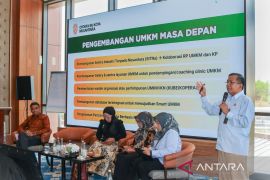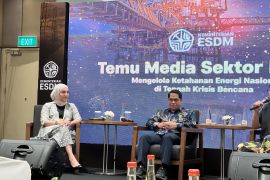"I am pleased to note that there has been a gradual increase of Indonesian tourists to Zimbabwe as a result of joint promotional activities between the embassy and Indonesias Outbound Tour Operators," Ambassador of Zimbabwe to Indonesia, Ms Alice Mageza, said here Friday.
The embassy has recorded more than 300 Indonesian tourists visiting Zimbabwe and some of its neighbouring countries for the period, she said.
Ambassador Mageza made these remarks during a meeting with members of the Indonesian Muslim Journalists Association (PJMI), university students and others in relation to the Ramadhan Dialogue Series with some African ambassadors to Indonesia.
The series is organised by PJMI in collaboration with the Center for Southeast Asian Studies (CSEAS) Indonesia and the State Islamic University of Syarif Hidayatulloh.
Muhammad Najib, a member of the House of Representatives, B. Dharmawan from the Center for Policy Analysis and Development on Asia Pacific and Africa Region, the Ministry of Foreign Affairs, DR. Arisman, Director Executive of CSEAS, and Mohammad Anthoni, the chairman of PJMI also attended the dialogue titled "Current Economic and Social Development in Africa".
Indonesian tourists visit the Victoria Falls, one of the seven wonders of the world, which has been the targeted tourist destination marketed by Indonesias Outbound Tour Operators.
"While the numbers visiting the Victoria Falls can be increased to more than one thousand or more every year, many other attractive tourist destinations in Zimbabwe remain unknown to Indonesians" she said.
These tourist attractions include the capital city Harare with its well planned residential suburbs, purple jacaranda trees lining streets in September when they bloom, the arts and culture richness in Harare and the nearby Lion and Cheetah Park.
There is also the Hwange National Park and Wildlife where the Big Five's elephant, rhino, lion, buffalo and leopard have their homes. The hippopotamus and the crocodile are also found here.
The two countries must strengthen their relations in economy and trade in particular, Muhammad Najib said.
"Business people can work together for mutual benefit by using Zimbabwes Look East policy," Najib said.
It will take time for the two countries to increase their trade, according to him.
China and India, the giants of the developing world, have played particularly significant roles in Zimbabwe's foreign policy and making the Look East policy, giving priority to eastern investors. Trade between China and Zimbabwe and between India and Zimbabwe has increased significantly over the past decade.
Economic and Trade Relations
On economic and trade relations between Zimbabwe and Indonesia, the ambassador said they continue to grow.
Despite the absence of a formal Trade Agreement between Zimbabwe and Indonesia, trade flows between the two countries was significant in the period of 1999-2000 before Western countries imposed sanctions on Zimbabwe.
Tobacco and cotton, despite current low export volumes, remain Zimbabwes largest potential exports to Indonesia.
"There is also huge potential for Zimbabwe to supply soya bean, sugar and beef to Indonesia," Ambassador Mageza said.
The other exports to Indonesia include asbestos, iron and steel. Zimbabwe imports crude rubber, fatty acids, textiles, machinery and transport equipment from Indonesia.
The Indonesians expressed concern at the decline in Zimbabwes cotton production that has resulted in low exports since 2000, according to her.
To address this decline, Zimbabwe would welcome Indonesias involvement in contract growing of cotton and soya beans, she said.
This is because Zimbabwean farmers, due to the residual effects of sanctions, presently lack adequate financial resources to undertake large scale agricultural activities such as cotton, sugarcane and soya bean production.
"However, Indonesians seem to prefer buying finished products instead of getting involved in the contract growing of crops that they are in need of," she said.
In the long term, Indonesians should be encouraged to establish textile industries in Zimbabwe, Ambassador Mageza said.
"This will help them take advantage of their textile experience and get duty-free entry to the regional market of Southern Africa," she said.
This market is made up of 15 countries that form a regional economic community called the Southern Africa Development Community or SADC.
This community has goals and objectives similar to those of ASEAN. Companies which are part of SADC, export their goods duty-free under the rules of origin.
There is a strong demand for Zimbabwes tobacco and cotton exports in Indonesia.
The decline in cotton exports in 2009 was mainly because Zimbabwes aggregate cotton output slumped. Part of the slump was due to depressed produce prices given to Zimbabwes cotton farmers.
"This has discouraged them from cotton growing. At the same time Indonesia textile business are buying very expensive cotton from other global suppliers when they could buy the same quality for far less from Zimbabwe," she said.
Reporter: Mohammad Anthoni
Editor: Aditia Maruli Radja
Copyright © ANTARA 2014












